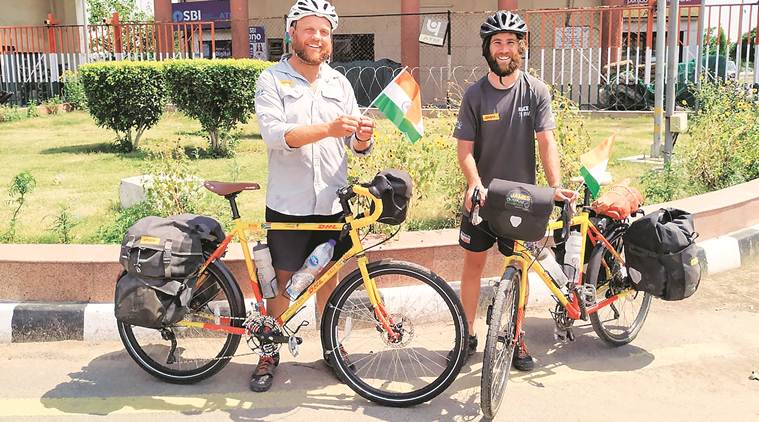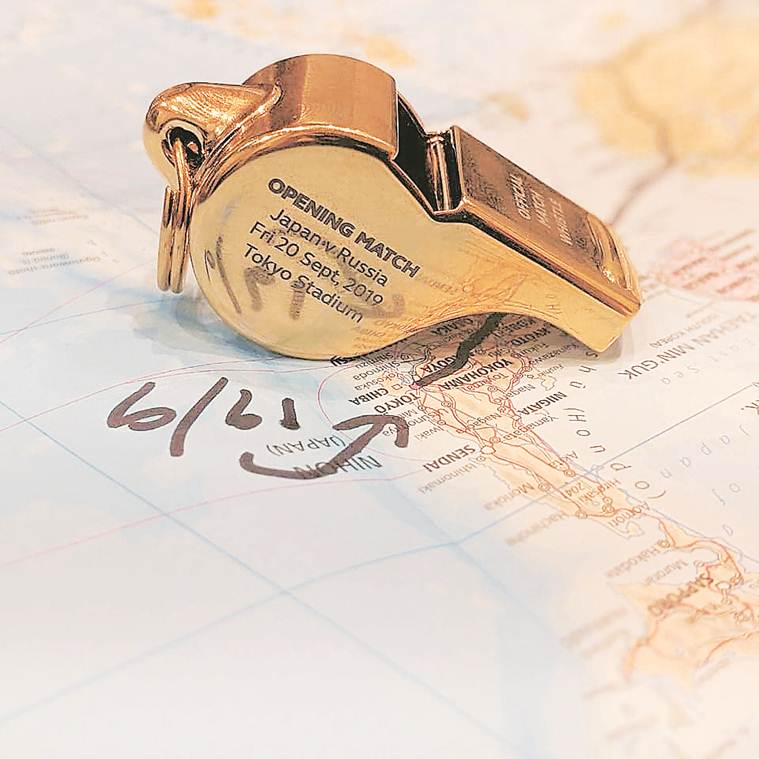
For 111 days now, James Owens, 28, and Ron Rutland, 44, are carrying around the official whistle that will kick off the opening match between Japan and Russia at the 2019 Rugby World Cup. Rutland pulls out the whistle and places it on the world map that he’s spread on the table. The referee will blow the same whistle in the match that will be held in Japan on September 20 later this year. Rutland points his finger at London, the city from where the duo started their 20,000 km journey 111 days ago. The two have now landed in India after 10,300 km. The plan is to complete the journey in 231 days.
Rutland is from Durban but has spent a lot of time in Cape Town. “Some years ago, I started my blog — ‘Fat kid on a bike’ — as I used to cycle a lot. Before the 2015 Rugby World Cup, I did a self-funded cycle ride to London. This ended at the Twinkenham Stadium. This time, when we started from the Twinkenham, we knew that this ride of 20,000 Kms will be a lot tougher. I have been passionate about adventure and rugby all my life and this is an opportunity to experience both,” says Rutland.

As an employee of an event management firm in South Africa, Rutland would see rugby events in South Africa and would often plan short-distance cycle rides around Cape Town. Post the ride from South Africa to England in 2015 before the Rugby World Cup, Rutland suffered a hip injury last year. “Which is why I had to start from scratch to prepare for this ride. As a cyclist, one understands that it is not like a normal trip and one faces different challenges in terms of elevation gain and weather conditions, apart from planning the stops on the route. But then one gets time to spend on the road, meet different people from different cultures, which cannot be done in car or any other mode of transport,” says Rutland.
With the 2019 edition of the Rugby World Cup happening from September 2019, the South African planned his tour and found support from one of the tournament’s official sponsors. Rutland was soon joined by another rugby enthusiast, Owens, who is based in Vietnam. The two spent hours chalking out the routes and other requirements of the ride. “The idea for this ride came in April 2018, and it took us six months to plan the ride. We didn’t want to skip any country and reach a day before the World Cup starts in Tokyo,” shares Rutland.
The ride started on February 2 and the last 111 days have seen the cyclists cross 20 countries including India, Turkey, Iran, Uzbekistan, Tajikistan, China and Pakistan among others. With temperatures ranging from zero degrees to 10 degrees in Europe and Iran apart from Tajikistan, the duo cycled for more than 100 km every day. “When we started, temperatures were low in Europe. Apart from the physical challenge it was also mentally tough. One of the toughest bits about the ride has been cycling through the Pamir highway in Tajikistan where we cycled at an elevation of 4,000 metres for a week with bad road conditions and less air to breathe,” says Owens.

From sleeping under flyovers in Iran to cycling in the snow, the duo saw it all. Out of the 111 days, the two had 11 rest days, five of which happened due to the closure of Tajikstan-China border. The ride has also seen the cyclists gain elevations close to 4,000 metres and steep descends such as from Kunjareb pass in Pakistan. “We were in Tajikistan and China closed the border due to Labour Day holidays. After crossing the Khunjareb pass in Pakistan, in one of the villages in Gilgit, some of the kids played with the rugby ball, which we are carrying, and the ball went into Indus river. The kids swam in the river and retrieved the ball. We were carrying two balls and we gave one of them to those kids,” says Owens.
This week, the two will cross into Nepal from Uttar Pradesh before re-entering India at the Panitanki border near Darjeeling. They will then cross the northeastern states before entering Myanmar at Morey in Manipur. And Rutland finds only one thing consistent with the 27 countries they are travelling to. “People are amazing. Whether we talk about the UK, France, Tajikstan, China, Pakistan or India, the pre-conceived notions about various countries does not show the reality. 99 per cent of the people in those countries are good and they were the ones, who offered us food and accommodation without knowing us. It gave us an opportunity to interact with local people and enjoy the food. In Iran, we were struggling with frostbite during snowfall. An elderly man stopped his car and told us to get into it. We told him we cannot do that. He cheered us and drove behind us for a while. Similar things happened in India too, when we entered Amritsar and people would offer us food and cycle with us to motivate us,” concludes Rutland.